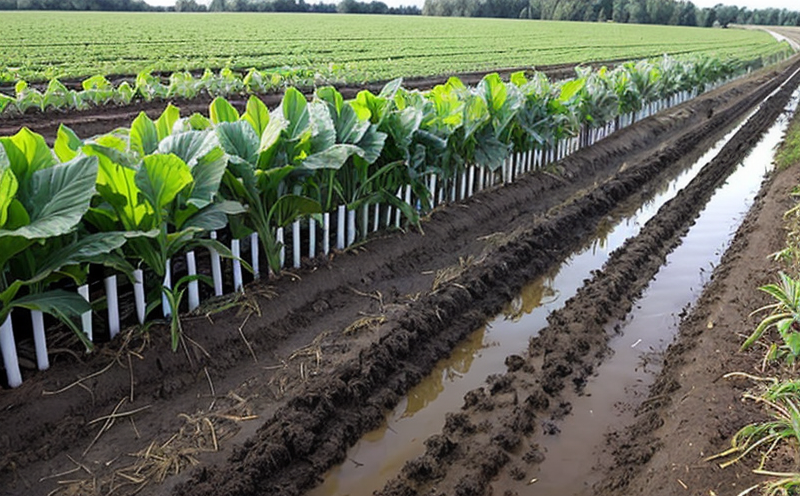ASTM D7065 Polycyclic Aromatic Hydrocarbons Test in Agricultural Runoff Water
The ASTM D7065 test method is a critical tool used to assess the presence of polycyclic aromatic hydrocarbons (PAHs) in agricultural runoff water. PAHs are a group of chemicals that have been linked to various environmental and health hazards, including cancer and other serious illnesses when present in high concentrations.
This testing procedure is essential for quality managers, compliance officers, R&D engineers, and procurement teams working within the sector of water & wastewater testing. The test ensures that agricultural runoff does not contain PAHs at levels that could pose risks to ecosystems or human health. By adhering to this standard, companies can maintain environmental sustainability and comply with regulatory requirements.
The ASTM D7065 method involves several steps designed to accurately quantify the concentration of PAHs in water samples. This includes proper sample collection, preservation, and analysis using chromatographic techniques such as high-performance liquid chromatography (HPLC) or gas chromatography/mass spectrometry (GC/MS). The analytical methods employed are sensitive enough to detect even trace amounts of these compounds.
One key aspect of this testing procedure is ensuring that the sample preparation steps do not introduce any contamination. This requires strict adherence to protocols for handling and storing the samples before analysis. Additionally, calibration standards must be used correctly during the analytical process to ensure accurate results.
The ASTM D7065 test also considers matrix effects which are common in agricultural runoff water due to its complex composition. These matrix components can interfere with the detection of PAHs and thus affect the accuracy of the measurements if not accounted for properly. Proper sample pretreatment methods, such as solid-phase extraction (SPE) or liquid-liquid extraction (LLE), may be necessary depending on the specific conditions encountered during field sampling.
The significance of this test cannot be overstated given its role in protecting both natural environments and public health by monitoring agricultural runoff for harmful contaminants. It plays a crucial part in maintaining compliance with local, national, and international regulations aimed at reducing pollution from agriculture sources into surface waters.
Applied Standards
| Standard | Description |
|---|---|
| ASTM D7065-18 | This standard provides a procedure for the extraction and determination of polycyclic aromatic hydrocarbons (PAHs) in water by high-performance liquid chromatography with ultraviolet-visible detection or gas chromatography/mass spectrometry. |
Why Choose This Test
- Ensures compliance with environmental regulations regarding agricultural runoff.
- Aids in the protection of local ecosystems from contamination by PAHs.
- Promotes sustainable agricultural practices by identifying potential sources of pollution early on.
- Helps maintain public health standards by ensuring safe levels of PAHs are not introduced into drinking water supplies through runoff.
Environmental and Sustainability Contributions
The ASTM D7065 polycyclic aromatic hydrocarbons test in agricultural runoff water significantly contributes to environmental protection efforts. By regularly monitoring for PAHs, this testing helps prevent the spread of these harmful substances into nearby bodies of water.
Through early detection and intervention measures based on the results obtained from ASTM D7065 analyses, farmers can take proactive steps towards reducing their impact on aquatic environments. This includes adjusting irrigation practices or implementing new technologies that minimize runoff containing PAHs.
Incorporating such tests into routine agricultural management protocols not only supports long-term ecological health but also aligns with broader sustainability goals like preserving biodiversity and promoting cleaner water resources for future generations.





